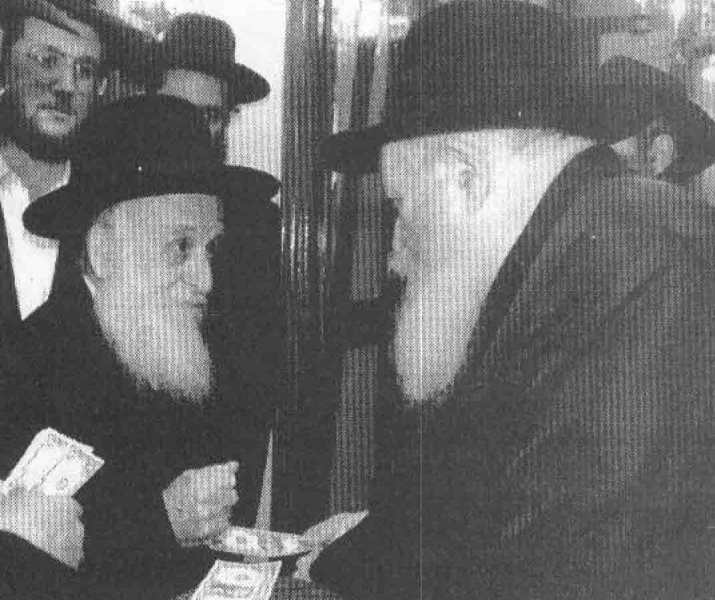Suka 6b
Tamuz 15, 5780. July 7, 2020
Some points from the Shiur, in brief:
1- The Beraisa with the opinions of the חכמים and Reb Shimon about the minimum amount of walls a Sukkah requires:

חכמים – two full walls and one טפח.
רבי שמעון – three full walls and one טפח.
2- Our Gemare presents 5 explanations as to the logic of this argument.
3- We discussed at length the concept of
There are many words written in the תורה that are pronounced slightly different than the way they are actually spelled. That is the מסורה (written) versus the מקרא (reading).
With most of these occurrences, the meaning does not change whether one follows the written text or the way it’s pronounced.
To use an example from this week’s Parsha – Pinchos.
Now Pinchos can be written as פנחס or with an added Yud- פינחס.
In the Torah we find it written both ways. Regardless, it all sounds and means the same. The name of the person called פנחס.
Occasionally, the way it is written has a different, and opposite, meaning to the way it is pronounced. Sukkah is one of them.
The Posuk concerning the building of a Sukkah has the word Sukkah three times. But twice it is written as סכה and once סוכות.
בַּסֻּכֹּת תֵּשְׁבוּ שִׁבְעַת יָמִים כָּל הָאֶזְרָח בְּיִשְׂרָאֵל יֵשְׁבוּ בַּסֻּכֹּת.
לְמַעַן יֵדְעוּ דֹרֹתֵיכֶם כִּי בַסֻּכּוֹת הוֹשַׁבְתִּי אֶת בְּנֵי יִשְׂרָאֵל בְּהוֹצִיאִי אוֹתָם מֵאֶרֶץ מִצְרָיִם אֲנִי יְהוָה אֱלֹהֵיכֶם.
If we follow the written word, סכת, סכת, סכות, we arrive at a total of 4 mentions of the Sukkah.
However, if we are to follow the way it’s pronounced סוכות ,סוכות ,סוכות we have a total of six!
As the Gemare explains, using the two methods, מסורה או מקרא, one comes to different conclusion of the minimum amount of walls required when one builds a Kosher Sukkah.
4- We quoted the RI”F who explains the feminine expression אם למקרא as opposed to the masculine expression used by בנין אב.
Also discussed the thought of the שערים מצוינים בהלכה. Written by the grandfather of Rabbi Braun, of the Crown Heights Beis Din.

הרב שלמה זלמן ברוין אצל הרבי
5- We briefly discussed the issue of the Mitzvah of writing a Sefer Torah today.
The Gemore says that already in its time סופרים were unsure as to all the חסרים ויתרות.
A Sefer Torah that is missing a single letter is not Kosher.
Sha’agas Arye concludes that today, we simply cannot be מקיים this Mitzva because we are unsure how to write every word!
Minchas Chinuch (613) disagrees. True he says, a Sefer Torah that is missing a single letter is not Kosher. But that is only with words that create a practical difference based upon the way it is spelled. Writing פנחס או פינחס makes no Halachik difference. Whichever way one writes it, it is Kosher בדיעבד.

When is a Sefer Torah invalid if written incorrectly, concludes the מנחת חינוך, only when the error would create a practical difference. As an example he uses סכת and סכות.
Whenever there is a מחלוקת of יש אם למקרא or יש אם למסורה there was never an argument as to the way it was written or pronounced. They argued as to which one we should follow.
If one would spell it differently it would indeed make the ספר תורה not Kosher.
And in such places throughout our entire history there never was a doubt on how exactly we should write it.
Therefore, even today there is a valid Mitzvah to write a ספר תורה.
See here where the Rebbe brings both the שאגת אריה and the מנחת חינוך. Footnote 19.
Short notes in Hebrew:
אם למסורה.
שו”ת הרי”ף. איני יודע. אולי- כי מבנין אב למידין לענין אחר. משא”כ אם למסורה רק לנידן דידן.
שערים המצויינים בהלכה – אם עקרת הבית – נשארת במקומה.
אלישב. בנין אב- רק מדמין ויכול להיות שאין דמיון. כמו אב שלאו דווקא הוא האב. משא”כ האמא היא מאה אחוז.
שאגת אריה שהיום א”א לקיים מ”ע של כתיבת ס”ת. כי אין אנו בקיאין.
מנ”ח- ח”ו לומר כן, מדלא כתבו הראשונים. חסר ויתר שאינו נוגע להלכה לא פסול. רק במקומות כמו: יש אם למקרא.
על כללות החיוב של כתיבת ס”ת היום, דעת הרא”ש וכו’, לקו”ש כג, 17.